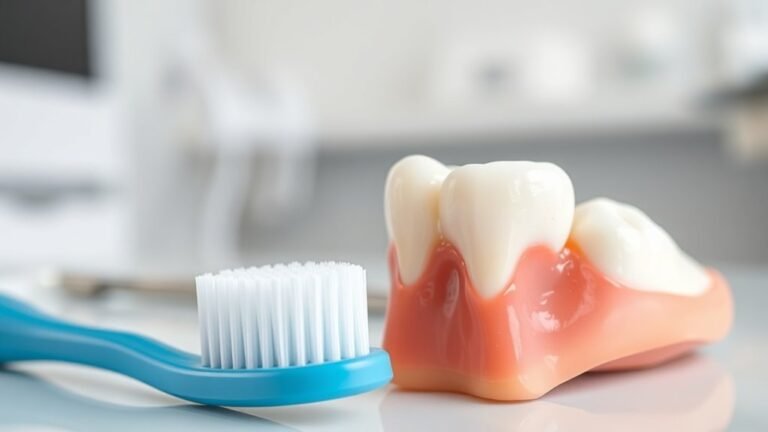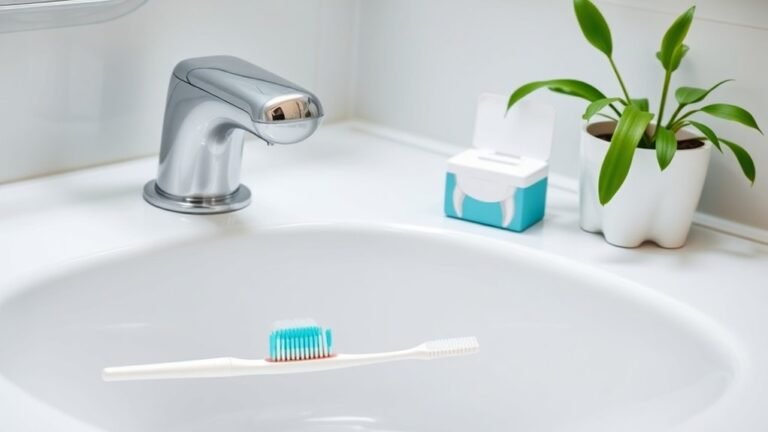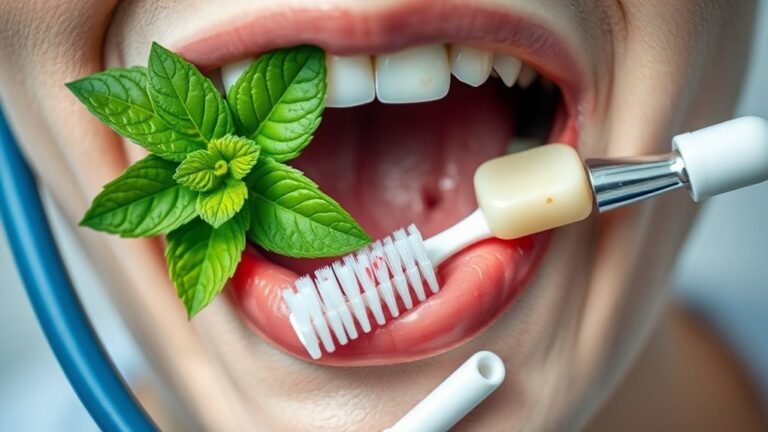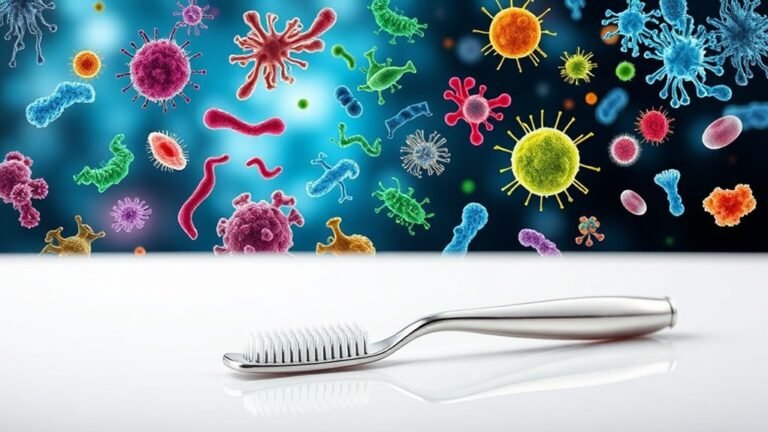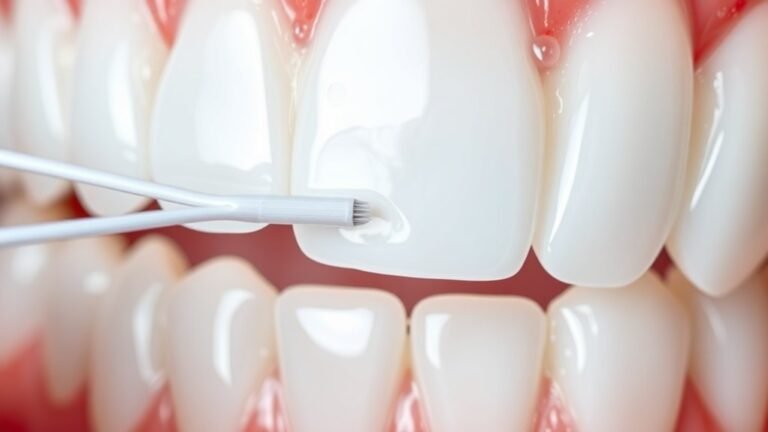Cleaning Dental Appliances Removes Odors Caused by Bacteria Buildup
Cleaning your dental appliances is essential for removing odors caused by bacteria buildup. Regular cleaning prevents bacteria like Streptococcus mutans and Candida albicans from thriving, which reduces bad odors and the risk of oral diseases. Rinsing after use, using gentle cleaning methods, and soaking in recommended solutions can help keep your appliances fresh and effective. If you want to discover more about effective cleaning techniques and products, there’s plenty more to explore.
Key Takeaways
- Regular cleaning of dental appliances prevents bacteria buildup, which is a primary cause of unpleasant odors.
- Bacteria like Streptococcus mutans and Candida albicans thrive on unclean appliances, leading to bad smells.
- Cleaning breaks down bacterial biofilms, which harbor odor-causing microorganisms and food residue.
- Using effective cleaning products, such as vinegar and baking soda, helps neutralize odors and disinfect appliances.
- Establishing a consistent cleaning routine ensures long-term freshness and enhances overall oral health.
The Importance of Cleaning Dental Appliances
When you wear dental appliances, keeping them clean is crucial for both your oral health and overall well-being. Proper maintenance of these devices directly impacts your oral hygiene, as neglecting to clean them can lead to bacteria buildup. Bacteria thrive in the warm, moist environment of your mouth, and they can easily transfer to your dental appliances. This accumulation may cause bad odors and contribute to oral diseases like gum infection or tooth decay. Regularly cleaning your dental appliances not only helps eliminate these risks but also enhances their longevity. By establishing a consistent cleaning routine, you guarantee that your dental appliances remain effective and safe, supporting your overall health and confidence in your smile.
Common Bacteria Found on Dental Appliances
Neglecting to clean your dental appliances can lead to the growth of harmful bacteria that pose risks to your oral health. Common culprits include:
Neglecting dental appliance hygiene can promote harmful bacteria, threatening your oral health and freshness.
- Streptococcus mutans: This bacteria contributes to tooth decay and is often found in plaque on dental appliances.
- Candida albicans: A yeast that can thrive on uncleaned appliances, leading to infections and discomfort.
- Actinomyces species: Known for causing gum disease, these bacteria can proliferate due to bacteria buildup on your dental devices.
Ignoring these threats can result in not just breath odor bacteria but also serious health issues. Regular cleaning is essential to maintaining your appliances and ensuring your mouth stays healthy and fresh.
How Bacteria Cause Odors in Dental Appliances
Bacteria thrive in the warm, moist environment of dental appliances, producing volatile compounds that contribute to unpleasant odors. When you wear your appliances, bacteria form a bacterial biofilm, a slimy layer that adheres to the surfaces. This biofilm harbors various microorganisms, which metabolize food particles and saliva, releasing compounds that lead to breath odor. As these bacteria multiply, they create a breeding ground for foul smells. If you neglect proper cleaning, the accumulated biofilm becomes increasingly difficult to remove, perpetuating the cycle of odors. Regularly cleaning your dental appliances is essential to break down this biofilm and eliminate the bacteria responsible for unpleasant breath. Maintaining cleanliness not only enhances your comfort but also improves your overall oral health.
Recommended Cleaning Techniques for Different Appliances
When it comes to cleaning your dental appliances, establishing a daily cleaning routine is essential for maintaining hygiene. You’ll also want to incorporate deep cleaning methods periodically to guarantee thorough sanitation. Let’s explore effective techniques tailored for various types of dental appliances.
Daily Cleaning Routines
Maintaining a daily cleaning routine for your dental appliances is essential to affirm their longevity and your oral health. By incorporating effective cleaning techniques, you can guarantee plaque removal and enhance your overall oral care routine. Here are three recommended steps:
- Rinse: After each use, rinse your appliance thoroughly with warm water to remove food particles and bacteria.
- Brush: Use a soft-bristle toothbrush and mild soap or specific cleaner to gently brush all surfaces, focusing on hard-to-reach areas.
- Soak: For deeper cleaning, soak your appliance in a denture cleaner or vinegar solution for 15-30 minutes, affirming all bacteria and odors are eliminated.
Deep Cleaning Methods
To guarantee your dental appliances receive the thorough care they need, employing deep cleaning methods tailored to each type of appliance is essential. For retainers, soak them in a mixture of equal parts water and white vinegar for about 30 minutes, then gently brush to remove any bacterial buildup. For dentures, consider using a denture cleaner specifically designed for deep cleaning; follow the manufacturer’s instructions carefully. If you have aligners, use a soft toothbrush and a mild soap solution, confirming you avoid abrasive materials. Regular deep dental cleaning not only eliminates odors but also prolongs the life of your appliances. Always rinse thoroughly after cleaning to confirm no residue remains that could irritate your mouth.
Best Products for Cleaning Dental Appliances
When it comes to cleaning your dental appliances, choosing the right products is essential for maintaining their integrity and hygiene. You’ll find effective cleaning solutions specifically designed for various materials, as well as natural alternatives that can be just as effective. Understanding these options will help you make an informed decision to keep your appliances in top condition.
Effective Cleaning Solutions
While keeping your dental appliances clean is crucial for your oral health, selecting the right cleaning solution can make all the difference. Here are three effective cleaning solutions to take into account for breath odor control:
- Hydrogen Peroxide: This powerful disinfectant not only eliminates bacteria but also helps whiten your appliances.
- Dental Cleaning Tablets: Specifically designed for dental appliances, these tablets dissolve in water, effectively removing stains and odors while sanitizing.
- Vinegar and Baking Soda: A natural alternative, this combination breaks down buildup and neutralizes odors without harsh chemicals.
Using these effective cleaning solutions regularly will help you maintain your appliances and guarantee a fresh, clean mouth. Prioritize your oral health by choosing the right products for best results.
Natural Cleaning Alternatives
For those seeking a more natural approach to cleaning dental appliances, several effective products can help maintain hygiene without harsh chemicals. Baking soda is a popular choice; it not only removes stains but also neutralizes odors, promoting a healthier oral microbiome. You can create a paste with water to scrub your appliances gently. White vinegar is another excellent option, as its antibacterial properties can help eliminate bacteria buildup. Simply soak your appliances for 30 minutes, then rinse thoroughly. Essential oils, like tea tree or peppermint, offer additional antimicrobial benefits; just add a few drops to your cleaning solution. By using these natural cleaning alternatives, you can enhance your dental care routine while protecting your overall oral health.
Daily Care Tips for Maintaining Freshness
To keep your dental appliances fresh and hygienic, it is essential to establish a daily care routine. Follow these tips for effective bacterial control and breath freshening:
Establish a daily care routine for your dental appliances to ensure freshness and hygiene.
- Rinse After Use: Always rinse your appliances with warm water immediately after use to minimize bacteria buildup.
- Clean Regularly: Use a soft toothbrush and mild soap or a specialized cleaner daily to scrub away any residue and prevent odors.
- Store Properly: Keep your appliances in a clean, dry container to avoid exposure to bacteria and moisture.
Signs Your Dental Appliance Needs Cleaning
If you notice changes in your dental appliance’s appearance or smell, it’s likely time for a thorough cleaning. For retainers, look for discoloration or a cloudy appearance, which can indicate bacteria buildup. An unpleasant odor is another clear sign that your retainer needs attention. Similarly, if your dentures feel slimy or develop stains, it’s a strong indication they require cleaning. Additionally, if you experience increased irritation in your gums or mouth while wearing these appliances, that could signify an accumulation of debris or bacteria. Regularly checking for these signs will help maintain your oral health and guarantee your appliances function effectively. Don’t wait for discomfort; act promptly to keep your retainers and dentures fresh and clean.
Long-Term Benefits of Regular Cleaning
While neglecting the cleaning of your dental appliances may seem harmless at first, committing to regular maintenance offers significant long-term benefits. Keeping your appliances clean can help you:
- Prevent Gum Disease: Regular cleaning reduces plaque buildup, lowering the risk of gum inflammation and disease.
- Reduce Oral Infections: Eliminating bacteria minimizes the chances of developing infections, promoting overall oral health.
- Enhance Durability: Proper maintenance extends the lifespan of your appliances, saving you money on replacements.
Frequently Asked Questions
Can I Use Regular Soap to Clean My Dental Appliances?
You shouldn’t use regular soap to clean your dental appliances. It can leave residues that may harm your health. Instead, opt for products specifically designed for dental appliances to guarantee proper cleaning and hygiene.
How Often Should I Clean My Dental Appliances?
You should clean your dental appliances daily to maintain oral hygiene. Regular cleaning helps prevent bacteria buildup and guarantees your appliances stay fresh. Always follow your dentist’s recommendations for specific cleaning routines tailored to your needs.
Are There Natural Cleaning Solutions for Dental Appliances?
Yes, you can use natural solutions like a mixture of vinegar and water or baking soda with hydrogen peroxide. These options effectively clean your dental appliances without harsh chemicals, ensuring they’re fresh and safe for use.
What Should I Avoid When Cleaning My Dental Appliances?
Avoid using harsh chemicals, abrasive materials, or boiling water when cleaning your dental appliances. These can damage the surfaces, compromise their fit, and lead to unwanted odors or bacteria growth. Stick to gentle, recommended cleaning solutions.
Can Cleaning Dental Appliances Prevent Gum Disease?
Yes, cleaning your dental appliances regularly can help prevent gum disease. By removing plaque and bacteria, you maintain better oral hygiene, reducing inflammation and the risk of gum-related issues. Don’t underestimate the importance of cleanliness!
Conclusion
To sum up, keeping your dental appliances clean is essential for your oral health and comfort. As the saying goes, “an ounce of prevention is worth a pound of cure.” By regularly cleaning your appliances, you can prevent bacteria buildup and unpleasant odors. Remember to implement daily care tips and use recommended products to maintain freshness. Staying proactive in your cleaning routine not only enhances your experience but also promotes long-term health benefits for your smile.


